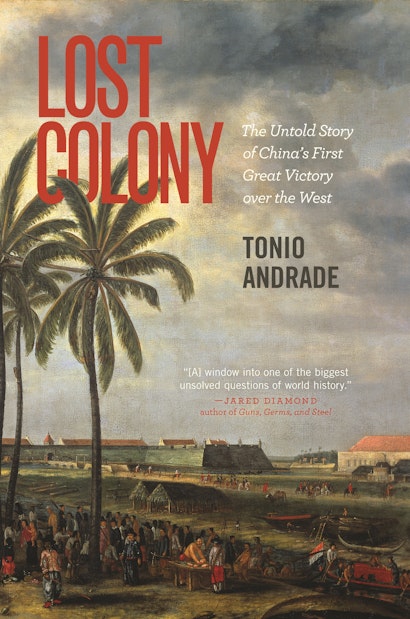During the seventeenth century, Holland created the world’s most dynamic colonial empire, outcompeting the British and capturing Spanish and Portuguese colonies. Yet, in the Sino-Dutch War—Europe’s first war with China—the Dutch met their match in a colorful Chinese warlord named Koxinga. Part samurai, part pirate, he led his generals to victory over the Dutch and captured one of their largest and richest colonies—Taiwan. How did he do it? Examining the strengths and weaknesses of European and Chinese military techniques during the period, Lost Colony provides a balanced new perspective on long-held assumptions about Western power, Chinese might, and the nature of war.
It has traditionally been asserted that Europeans of the era possessed more advanced science, technology, and political structures than their Eastern counterparts, but historians have recently contested this view, arguing that many parts of Asia developed on pace with Europe until 1800. While Lost Colony shows that the Dutch did indeed possess a technological edge thanks to the Renaissance fort and the broadside sailing ship, that edge was neutralized by the formidable Chinese military leadership. Thanks to a rich heritage of ancient war wisdom, Koxinga and his generals outfoxed the Dutch at every turn.
Exploring a period when the military balance between Europe and China was closer than at any other point in modern history, Lost Colony reassesses an important chapter in world history and offers valuable and surprising lessons for contemporary times.
"In this page-turning historical narrative, Andrade chronicles the 1661-62 battle for Taiwan in what is often seen as the first modern conflict between an Eastern and Western power. While historians have traditionally viewed Europeans then as more advanced in science, technology, and political infrastructures than their Eastern counterparts, Andrade reveals that Chinese warfare tactics based on ancient texts and military philosophy, built up over a millennia of a rich cultural heritage, actually allowed for the enigmatic leader Koxinga and his Chinese generals to neutralize any European superiority in weaponry and defeat the Dutch and thus the Dutch East India Company's hold on Taiwan. . . . For the global and military history enthusiast, this book is exceptionally insightful about the early-modern history of European contact in Asia."—Library Journal
"Tonio Andrade succeeds brilliantly not only in writing good history but in telling a gripping story. If you read only one book on Chinese history this year . . . make it this one."—Timothy Brook, Literary Review
"A most interesting, very well-written and highly important account of the Dutch loss of Taiwan that is deliberately located in terms of the debate over Western military proficiency vis-á-vis that of China. The book offers much."—Jeremy Black, European Review of History
"[The Lost Colony] could easily pass for an exciting historical novel. Andrade spins a gripping tale, full of excellent anecdotes and insights . . . well written with a wealth of details that are well documented."—Gerrit van der Wees, Taipei Times
"Lost Colony proves to be a good read as Andrade turns that would seem like a minor footnote in history into a stirring and insightful account of military campaigns, pirates, sieges, treachery, and naval battles."—Hilton Yip, Asian Review of Books
"Andrade's provocatively titled book is a much-needed addition to the relatively small body of work about pre-modern Taiwan in English that tells how the infamous Zheng Chenggong (Coxinga) threw the Dutch off the island in 1662. He draws very deeply on rich archival sources in both Dutch and Chinese to give a vivid, almost overly detailed, account from both sides of the conflict."—Choice
"[T]his monograph is a triumph of narrative brilliance and academic depth at the same time. It rarely happens that a work of such scholarly profundity will appeal to scholars . . . and a general non-specialist readership hungry for an exciting story."—Barend Noordam, Shilin
"Andrade gives a colourful, detailed explanation of the Chinese victory at Zeelandia, carefully weighing both sides' leadership, tactics, weaponry, ships and fortifications. . . . This is engaging history, rooted in copious records kept at the time, by a reflective writer with a good story to tell—both about the events of 1661 and how history itself gets written."—Michael Clugston, South China Morning Post
"[T]his is an excellent work, a must-read for scholars interested in early modern contact between Asia and Europe, the histories of Taiwan and China, and the history of warfare. It would also serve as an excellent addition to courses due to its readable and engrossing narrative, solid research, and well-reasoned argument."—Scott Relyea, Historian
"Andrade's larger argument is supported by an engaging narrative that is written in accessible prose that makes it suitable for use in high school or undergraduate university classes. Andrade lays out large themes and historiographical controversies in clear, understandable language. Perhaps more importantly, the engaging narrative will hold students' interest. . . . I look forward to using it in my own world history and Asian history courses in the future."—Robert Hoppens, Education about Asia
"Lost Colony is ambitiously theorized, well researched, stimulatingly argued, and beautifully written. Those interested in Chinese, Asian, military, and global history will find it fruitful, stimulating reading. In terms of Asian military history, Lost Colony is another excellent addition to accomplishments over the last decade by scholars on South, Southeast, and East Asia, but military history of Asia still lags behind that of Europe. A genuine global (non-Eurocentric and non-Asiacentric) military history is one step closer due to Lost Colony."—Sun Laichen, Journal of Asian Studies
"This is an intriguing book with remarkable and lively accounts written in accessible prose and with engaging humour. It also offers valuable information and insight about Europe's first war with China as well as Chinese history in general, and provides a welcome and much-needed addition to our understanding of military and maritime history more specifically."—Chia-Lin Huang, European History Quarterly
"Lost Colony makes a major contribution not only to the historiography of Taiwan, but indeed to that of the wider genre of maritime Asia. It provides an excellent basis for comparative inter-disciplinary studies."—Niki Alsford, IRA
"With its meticulous use of detailed and colorful sources, this account should appeal to a wide readership."—Roger Des Forges, Historian
"You can read this book as an exciting novel full of pirates, swashbuckling characters, beheadings, treachery, and battles on land and sea—a novel that just happens to be true—or as a revelatory look at the little-known first war between China and the West, and window into one of the biggest unsolved questions of world history: why Europe rather than China colonized the world from the time of Columbus onward. Either way, you will be sorry when you reach the last page."—Jared Diamond, author of Guns, Germs, and Steel and Collapse
"With arresting anecdote, colorful detail, and all the excitement of a contemporary novel, Andrade reconfigures the debate between revisionists and neotraditionalists on the question of whether, and to what extent, Europe's early modern preeminence reflected technological and military superiority over Asia. This book's analysis is as original as it is convincing."—Victor Lieberman, University of Michigan
"Based on impressive readings in Chinese and Dutch sources, Lost Colony examines fascinating interpretive issues on the changing nature of military power in various parts of the early modern world. Strong and important, this book tells a good story."—John E. Wills, Jr., author of 1688: A Global History
"This engaging and detailed book seeks middle ground in a longstanding debate regarding the alleged exceptionalism of European warfare. Examining a key conflict between Asian and European forces, Andrade opens a window on the Dutch colonial endeavor in Asia and its often symbiotic relationship with Chinese southern ventures, explaining how, with grit and luck, the Chinese gained Taiwan by successfully adapting and counteracting the military techniques of their opponents."—Michael Laffan, Princeton University


